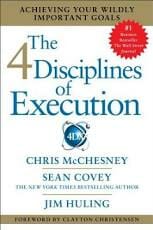Written By: Stephen Newland, AFC®

About a year and a half ago, I was tasked with increasing fundraising at a non-profit that I hold near and dear to me. About halfway through the process, I was struggling with chasing the next great idea that popped in my head. Along with that, I was just using the organization’s bank account as my barometer of success. Sure, that is one measure, but was it the right one? It felt like we were moving in the right direction, but I didn’t really take the time to define or measure it. Halfway through 2019, I was introduced to a book called the Four Disciplines of Execution and it completely changed how I approach personal, professional and most important goals with my clients.
The framework that is explained in the book focuses on four disciplines:
- Focus on the wildly important
- Act on the lead measures
- Keep a compelling scorecard
- Create a cadence of accountability
The authors use real-life examples of how they’ve introduced this framework to various problems like losing weight or increasing sales for a business. What I found most helpful about the framework is that it really can be applied to any area that someone wants to make progress in. I had more notes about how I could use this framework to help people make financial progress than any other personal finance book that I’ve read in a long time!
There are so many good stories and applications in the book, but here are a few high-level takeaways that I’ve found helpful since I’ve began applying these into my work and personal life:
- Focus on one goal, at most two, at a time.
- Establish an end date for the goal along with a measure of where I’m starting from and where I want to go. For example, I want to go from $5,000 in debt to $0 in debt by December 31st, 2020.
- After setting a goal, spend time determining what behavior(s) will lead to me achieving the goal. These need to be behaviors that have a great impact at moving the needle on my goal and they need to be behaviors that I can completely control. As an example, if someone wants to lose weight they might focus less on the scale and focus more on how many calories they eat daily and how many steps they take each week.
- Have a scoreboard that measures progress towards a goal, but also progress on those behaviors referenced in the bullet point above. Using the weight loss example, if I track how many calories I eat daily then I know well before I step on the scale if it’s going to give me a good or bad result. It also clearly shows me which behavior is the one I need to address. Maybe my exercise level is great, but my food intake is too high. A financial example of this could be whether someone is routinely tracking their expenses or not.
- The scoreboard needs to be simple. I need to be able to look at it and know if I’m “winning” or not within five seconds of looking at it.
- Have 15 minutes a week blocked off to review your scoreboard with someone else. Talk about what you did last week and what you need to do this week to continue making progress.
There are a lot more details to help with implementing this framework in the book and worth the time to dig in. After using this framework to lose 50 lbs in the past year, I started to implement a similar framework with my clients and am seeing good early returns with it!